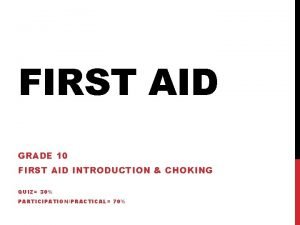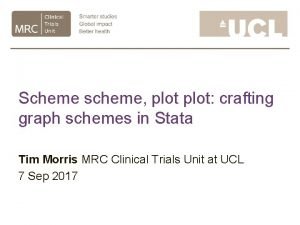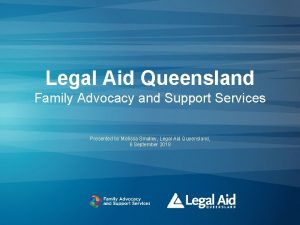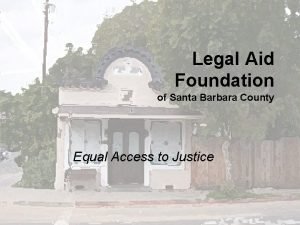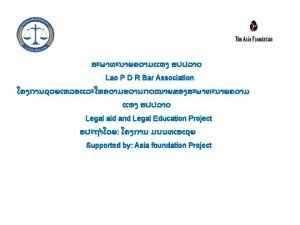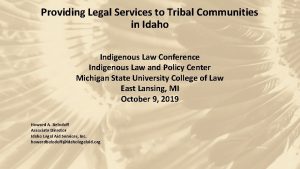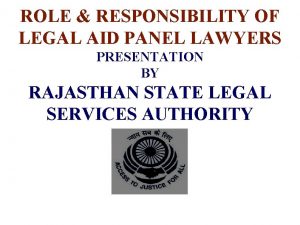LEGAL AID INTRODUCTION Legal Aid scheme was first














- Slides: 14

LEGAL AID

INTRODUCTION • Legal Aid scheme was first introduced by Justice P. N. Bhagwati under the Legal Aid Committee formed in 197. • The earliest Legal Aid movement appears to be of the year 1851 when some enactment was introduced in France for providing legal assistance to the indigent. • In Britain, the history of the organized efforts on the part of the State to provide legal services to the poor and needy dates back to 1944.

• Since 1952, the Govt. of India also started addressing to the question of legal aid for the poor in various conferences of Law Ministers and Law Commissions. • In 1960, some guidelines were drawn by the Govt. for legal aid schemes. • In 1980 a committee was constituted under the Chairmanship Justice P. N. Bhagwati to oversee and supervise the legal aid programmes through out the country.

LEGAL AID MEANING Legal Aid means giving free legal services to the poor and weaker section of society who cannot afford to take the service of advocate to conduct a case or any legal proceeding in the court of law, any judicial authority or before any judicial tribunal.

INDIAN CONSTITUTION AND LEGAL AID • Article 39 A of the Constitution of India provides that, “State shall secure that the operation of the legal system promotes justice on a basis of equal opportunity, and shall in particular, provide free legal aid, by suitable legislation or schemes or in any other way, to ensure that opportunities for securing justice are not denied to any citizen by reason of economic or other disability. ”

• Articles 14 and 22(1) also make it obligatory for the State to ensure equality before law and a legal system which promotes justice on a basis of equal opportunity to all. • Legal aid strives to ensure that constitutional pledge is fulfilled in its letter and spirit and equal justice is made available to the poor, downtrodden and weaker sections of the society.

• The Preamble of the Indian constitution basically aims to secure to the people of India socio economic and political justice. • His Lordship Justice P. N. Bhagwati aptly stated that: “ legal aid means providing an arrangement in the society which makes the machinery of administration of Justice easily accessible and in reach of those who have to resort to it for enforcement of rights given to them by law. • Article 38(1) provides that the State shall promote the welfare of the people by securing and protecting the social order including justice.

• Article 21 clearly says that every person has an equal right to life and liberty except according to the procedure established by the law. • The State shall secure that the operation of the legal system promotes justice, on a basis of equal opportunity, and shall, in particular, provide free legal aid, by suitable legislation or schemes or in any other way, to ensure that opportunities for securing justice are not denied to any citizen by reason of economic or other disabilities.

• In the case of Hussainara khatoon vs. State of Bihar, it was held that if any accused is not able to afford legal services then he has a right to free legal aid at the cost of the state. • It is the duty of the State to see that the legal system promotes justice on the basis of equal opportunity for all its citizens. • It must therefore arrange to provide free legal aid to those who cannot access justice due to economic and other disabilities.

• In the case of Khatri II v/s. State of Bihar, (1981) 1 SCC; 1981 honorable court said that the Constitutional duty to provide legal aid arises from the time the accused is produced before the Magistrate for the first time and continues whenever he is produced for remand.

• In another case Madav Hayavadanrao Hoskot Vs. State of Maharastra (1978)3 SCC 544 the court laid down that a person entitled to appeal against his/her sentence has the right to ask for a counsel, to prepare and argue the appeal. • And the criteria for giving legal services to the eligible persons of the society are laid down in Section 12 of legal services authority act 1987.

• In Suk Das v. Union Territory of Arunachal Pradesh , Justice P. N. Bhagwati, emphasized the need of the creating the legal awareness as: üpoor people do not know their rights more particularly right to free legal aid and in India most of the people are living in rural areas are illiterates and are not aware of the rights conferred upon them by law. ü Even literate people do not know what are their rights and entitlements under the law. üIt is this absence of legal awareness they are not approaching a lawyer for consultation and advise.

• Justice Krishna Iyer, who is crusader of social justice in India, had rightly said that if a prisoner sentenced to imprisonment is virtually unable to exercise his constitutional and statutory right of appeal inclusive of special leave to the Supreme Court for want of legal assistance, there is implicit in the Court under Article 142 read with Articles 21 and 39 -A of the Constitution, the power to assign counsel for such imprisoned individual for doing complete justice‘.

• Introduction of Lok Adalats added a new chapter to the justice dispensation system of this country and succeeded in providing a supplementary forum to the litigants for conciliatory settlement of their disputes. • In 1987 Legal Services Authorities Act was enacted to give a statutory base to legal aid programmes throughout the country on a uniform pattern. • This Act was finally enforced on 9 th of November, 1995 after certain amendments were introduced therein by the Amendment Act of 1994.
 First aid merit badge first aid kit
First aid merit badge first aid kit Objective of first aid
Objective of first aid 3 domain scheme and 5 kingdom scheme
3 domain scheme and 5 kingdom scheme Stata schemes
Stata schemes Pyramid scheme vs ponzi scheme
Pyramid scheme vs ponzi scheme Government legal trainee scheme application process
Government legal trainee scheme application process Greenhill medical centre
Greenhill medical centre Legal assistance services townsville
Legal assistance services townsville Legal aid foundation santa barbara
Legal aid foundation santa barbara Objective of legal aid
Objective of legal aid Idaho legal aid services
Idaho legal aid services Legal aid iowa
Legal aid iowa Legal aid management system
Legal aid management system Legal aid panel
Legal aid panel Wilderness first aid patient assessment form
Wilderness first aid patient assessment form

